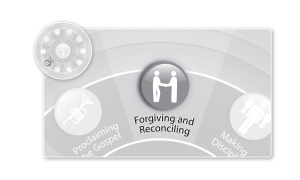 What makes Christian forgiveness so hard for we human beings to understand is that in our experience condemnation always follows judgment. The only thing we’ve experienced is people exposing our sins in order to humiliate us, hurt us, and make us pay the price.
What makes Christian forgiveness so hard for we human beings to understand is that in our experience condemnation always follows judgment. The only thing we’ve experienced is people exposing our sins in order to humiliate us, hurt us, and make us pay the price.
So we furrow our brow in puzzlement at Jesus’ practice of judgment coupled with mercy for all those who receive his judgment. But whether we understand it or not, this is how he offers forgiveness. “For God did not send his Son into the world to condemn the world,” Jesus tells Nicodemus in John 3:17, “but to save the world.”
Jesus comes as the light of the world. He casts out shadows, exposes sin for sin, darkness for darkness, lies for lies. And he does this even as, moved with compassion, he smothers the world’s evil in himself, bleeding his own blood in mercy. James 5:11 confirms, “The Lord is full of compassion and mercy.” The Lord pours out judgment, with mercy right on top of it for those who receive his judgment with their arms at their sides, accepting his judgment without a fight. Judgment and mercy are the divine coupling that constitute forgiveness.
Leniency, on the other hand, is the counterfeit version of mercy. Leniency is where we say, “Hey, everybody sins. Let’s not be too hard on him.” Leniency precedes judgment and derails it. Leniency happens when we fear judgment. Leniency hopes to shut God’s mouth and the mouth of God’s just ones, hiding the very things that must be named and judged in order to be forgiven and healed in Jesus’ name.
Leniency has become popular in a world that confuses judgment with condemnation. People who mistake leniency for mercy often quote Jesus’ words in Matthew 7:1 (KJV), “Judge not, that ye be not judged.” They say, “How can I criticize or correct someone else when I have problems of my own?” So they exercise leniency towards others and themselves, and in so doing they hinder the work of God in their lives and in the lives of those they have hurt.
But when Jesus says, “Judge not lest ye be judged,” he is not advocating a life devoid of judgment; instead, he is advocating a sober, searing judgment that is never separated from a mercy that sets free those trapped in sin and transforms them and those they have hurt by the power of the Holy Spirit.
Mercy is poured out at great personal cost to the one who offers it. Condemnation and leniency, on the other hand, cost the giver nothing and benefit the recipient not at all. They are thus not from God. No amount of failing to judge wrongdoers will bring oneself or others into the kingdom of God.
In the end, forgiveness is judgment plus mercy. In the eyes of the world, judgment is always bad, and judgment and condemnation go together to hurt people. But for God, it is judgment and mercy—naming the evil in ourselves and others and then smothering it in Jesus’ name and with our own body in order to point to his—that kiss.










